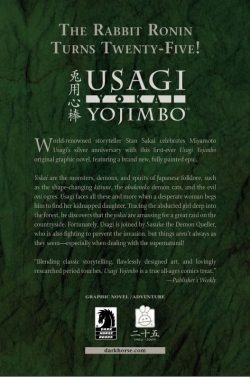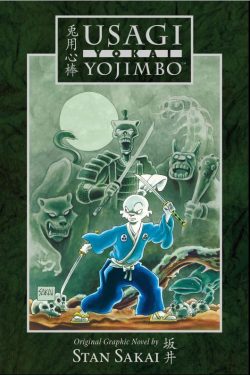

By Stan Sakai (Dark Horse)
ISBN: 978-1-59582-362-5 (HB)
One of the very best and most adaptable survivors of the 1980s black-&-white comic book explosion/implosion is a truly bizarre and wonderful synthesis of historical Japanese samurai fiction and anthropomorphic animal adventure, as well as a perfect example of the versatility and strengths of a creator-owned character.
Usagi Yojimbo (which translates as “rabbit bodyguardâ€) first appeared as a background character in multi-talented Stan Sakai’s peripatetic anthropomorphic comedy feature The Adventures of Nilson Groundthumper and Hermy, which launched in 1984’s furry ‘n’ fuzzy folk anthology Albedo Anthropomorphics #1. The shaggy samurai subsequently appeared there on his own terms, as well as in Amazing Heroes, Furrlough and the Munden’s Bar back-up strips in Grimjack. The Lepine Legend also appeared in Albedo #2-4, The Doomsday Squad #3 and seven issues of Critters (#1, 3, 6-7, 10-11 and 14) before leaping into his own series…
Sakai is almost as widely-travelled and far-ranging as his signature creation. He was born in 1953 in Kyoto, Japan before the family emigrated to Hawaii in 1955. He attended University of Hawaii, graduating with a BA in Fine Arts, and pursued further studies at Pasadena’s Art Center College of Design after moving to California.
His first comics work was as a letterer, most famously for the inimitable Groo the Wanderer, before his nimble pens and brushes – coupled with a love of Japanese history and legend and hearty interest in the filmic works of Akira Kurosawa and his peers – combined to turn a proposed story about a historical human hero into one of the most enticing and impressive – and astoundingly authentic – fantasy sagas of all time.
The deliciously rambling and expansive period fantasy series is nominally set in a world of sentient animals and specifically references the Edo Period of Feudal Japan (how did we cloth-eared Westerners ever get “Japan†from Nihon†anyway?) as well as classic cultural icons as varied as Lone Wolf and Cub, Zatoichi and even Godzilla, by way of detailing the exploits of Ronin (masterless, wandering freelance Samurai) Miyamoto Usagi, whose fate is to be drawn constantly into a plethora of incredible situations.
And yes, he’s a rabbit – a brave, sentimental, indomitable, gentle, long-suffering, honourable, conscientious and heroic bunny who cannot turn down any request for help…
The Sublime Swordsbun has changed publishers a few times but has been in continuous publication since 1987 – with dozens of graphic novel collections to date – and has guest-starred in numerous other series, such as Teenage Mutant Ninja Turtles and its TV incarnation. There are high-end collectibles, art prints, computer games and RPGs, a spin-off sci fi comics serial and lots of toys, and he even almost made it into his own small-screen show, but there’s still time yet and fashions can revive as quickly as they die out…
Sakai and his creation have won numerous awards both within the Comics community and amongst the greater reading public and in 2009 Dark Horse Comics commissioned an all-new, fully painted Silver Anniversary tale to celebrate 25 stunning years, which allowed the creator to hone his considerable skills with watercolours…
Yokai is a generic term that translates (as required) as ghosts, phantoms, spirits or even strange, otherworldly apparitions, all of whom hold a peculiarly eclectic place in Japanese folklore, being simultaneously mischievous and helpful, malevolent and miraculously beneficial. Generally, they have animal heads or are amalgams of diverse objects or body parts…
This scintillating scary story occurs over one night – an Oborozuki-Yo (“Night of the Hazy Moonâ€) – when Yokai are particularly restless, and this is a tale that grippingly explores the Japanese equivalent of our Halloween as the noble, gloom-shrouded Rabbit Ronin wanders lonely roads in search of a bite to eat and a place to sleep.
Seeing a light in the nearby woods, Miyamoto leaves the path, hoping to find a welcoming peasant hearth for the evening but is harassed by a taunting Kitsune (trickster-fox spirit) and becomes lost. Soon, however, he hears sobbing and is drawn to a weeping noblewoman…
The lovely distressed lady is Fujimoto Harumi whose pilgrimage to a temple was disrupted when a Kitsune stole her young daughter Hanako away. Pleading with the wisely reluctant Ronin, the lady convinces the wayfarer to plunge deeper into the wild woods to rescue the lost girl, leading to an epic series of contests against a horde of fantastic hostile creatures. The valiant warrior almost succumbs until he is unexpectedly saved by an old comrade, the mystic demon-queller Sasuke…
It seems that this very evening is the dreaded Hyakki Yako, “Night Parade of a Hundred Demonsâ€, when haunts and horrors of the netherworld form a procession into the world of people, seeking to subjugate all mortals. They simply need a living soul to lead them, a final sacrifice to light their way here…
Terrified for the stolen waif, Ronin and devil-slayer engage with an army of horrific, shape-shifting, fire-spitting, tentacle-wielding monstrosities to save an innocent and the entire world, but there are forces in play that the rapidly-tiring Miyamoto is painfully unaware of, and without the luck of the gods and the tragedy of an old friend, all will be inescapably lost…
Fast-paced yet lyrical, funny, thrilling and stuffed with spooky, all-ages action and excitement, Yokai is a magical tribute to and celebration of the long-lived Lepus’ nigh-universal irresistible appeal that will delight devotees and make converts of the most hardened hater of “funny animal†stories. This petite but power-packed chronicle – available in sturdy hardback and ethereal digital editions – also contains a fascinating behind-the-scenes look at how the artist created the stunning visuals in ‘The Real Magic Behind Yokai: an interview with Stan Sakai’ that will further beguile any prospective creators and cartooning hopefuls in the audience.
Sheer comicbook poetry, this is book to revisit time and time again…
Text and illustrations © 2009 Stan Sakai. All rights reserved.
